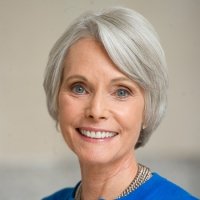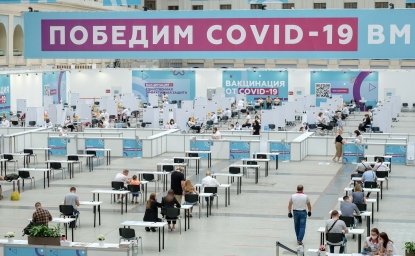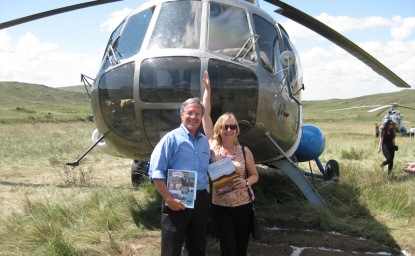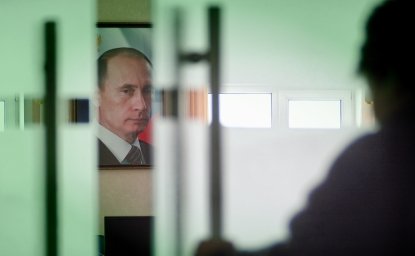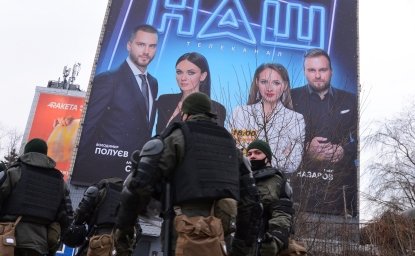This transcript has been lightly edited for clarity.
Jill Dougherty: From the Kennan Institute in Washington D.C., welcome to KennanX, a podcast on our never-ending quest to understand Russia, Ukraine and the surrounding region. I'm your host, Jill Dougherty.
***
[Clip from TV Rain broadcast]
Jill Dougherty: Breaking news on TV Rain, TV Dozhd. I'm sure most of our KennanX listeners know about it, or maybe even watch its YouTube broadcasts. Back in 2010, when it was founded by Natalia Sindeyeva and Vera Krichevskaya, it was known as the Optimistic Channel, a TV channel for young Russians and the liberal educated part of Russian society. It was fiercely independent, often criticized the Kremlin, and reported on the opposition, including protests against the government of Vladimir Putin.
[Clip from TV Rain broadcast]
Jill Dougherty: TV Rain first ran into trouble with the Kremlin in 2014, and in August 2021 it was declared a foreign agent. When Russia invaded Ukraine in February 2022, the Russian government began shutting down access to the channel. Ten days after the war began, staff gathered in the studio, walked out, declaring “no to war,” and within days, many of them fled Russia.
[Audio of TV Rain staff saying “no to war” in Russian]
Jill Dougherty: They found a safe haven in Latvia. They were on cable and were broadcasting back to Russia on YouTube. In November, I checked in with Ekaterina Kotrikadze, news director and anchor, to see how things were going since leaving Russia. And she sounded, well, optimistic.
***
Ekaterina Kotrikadze: We were in Istanbul for this devastating, terrible five days, first five days of exile. Then we moved to Tbilisi, Georgia and we spent approximately five months there trying to work on YouTube, trying to open our own channels. This was a tough period because, I mean, we were confused. We were not actually understanding what would come next. And then we have discovered that there was an opportunity to go to Latvia and to relaunch the channel, and we did so in July. We have started new TV Rain from Europe and right now we can see, Jill, and this is most important thing - that we are having more viewers on YouTube from Russia, more than we had before the war. And this is amazing.
***
Jill Dougherty: But on December 7th, in Latvia, TV Rain ran into a storm of criticism for comments by one of its reporters who seemed to say TV Rain was trying to help Russian servicemen in Ukraine with "equipment and basic amenities." The channel said the reporter misspoke. Latvian authorities revoked TV Rain’s license, calling it a threat to national security and social order. They also cited other, what they called, infractions for not dubbing programs in Latvian and accidentally broadcasting a map that showed Crimea as part of Russia. So I went back to Ekaterina Kotrikadze, contacting her in Riga. She tells me it was like a huge wave hitting TV rain.
***
Ekaterina Kotrikadze: We are not on cable anymore in Latvia, Lithuania, and Estonia. So right now we are thinking about the future steps, but we are in a disaster, I would say.
Jill Dougherty: It does sound like a disaster.
Ekaterina Kotrikadze: Well, our anchor, Alexei Korostelev, was on air talking about a mailbox that we have created after the mobilization was started in Russia. That mailbox was created to help people to avoid the mobilization and to talk about the stories of unfair mobilization, of [the] unfair approach to the Russian citizens and to their families. And we did make a lot of stories about that thanks to the mailbox. So, he was reminding people that TV Rain has this mailbox and people could write about unfair, illegal behavior of Russian government towards men, young men, fathers or children, brothers and so on and so forth. And then he was saying that “We hope that we can help soldiers on the front with an issue,” or something like that. I mean, he was talking about support. He was talking about the support of the mobilized men on the front, which is irresponsible, unacceptable. And this is not what we do.
***
Jill Dougherty: The editorial board immediately apologized and fired the reporter, who's been with TV Rain for eight years. But then in an emotional viral video, Natalia Sindeyeva begged him and some other reporters who quit in solidarity to come back.
***
Jill Dougherty: Right now, I hate to say, it looks like civil war. So where do you stand? I mean, where do you go from here? And how are you going to interact with Natasha Sindeyeva?
Ekaterina Kotrikadze: This last part looks like a soap opera to me, more than a civil war. But we feel like we are part of some, I don't know, terrible movie - very bad quality movie. It undermined everything that we were fighting for, [that] we've been fighting for, for so many years. And after the 24th of February, something like that gives you a huge problem with your reputation.
Jill Dougherty: In Russia, of course, predictably, this would be greeted with a lot of happiness by Russia, which, and I'm quoting one person who said, “Well, they went to the West, they thought there was freedom of the media and freedom of the press. And look what's happening. They criticize Russia. Well, look what's happening in Latvia. They're being shut down.” So you have, in addition to the internal problems, you have this external problem of Russia trying to take advantage of what's going on. So, what do you do about that? Does that make any difference? Or how does it affect you?
Ekaterina Kotrikadze: It doesn't affect us at all. But politically, it's not a good situation, obviously. We are in a bad position because our license was canceled, and we are not on the cable in Latvia, Lithuania, and Estonia anymore. This is the problem. And another problem is the reputational problem, because honestly saying, Jill, I'm experiencing right now a huge problem with Ukrainian speakers. They don't want to give us interviews anymore. A lot of them are refusing to talk to us on air, because they think that this is a reputational damage for them to have any conversations with TV Rain, which is a huge, huge problem.
Jill Dougherty: Mmhmm. So where do you go from here?
Ekaterina Kotrikadze: I don't know. I don't know. I mean, so many times we've been through this, and from Moscow to Istanbul, from Istanbul to Tbilisi, from Tbilisi to Latvia. And now I don't have strength anymore, I think, it's too hard. I don't know. But we will keep on because we don't have a choice. We need to go on with our work and you know that we have approximately 23 million unique viewers monthly only on YouTube, and 14 million unique viewers monthly from Russia. People rely on us. They need us. We cannot just stop working because we are tired, we're exhausted. This is something that we cannot afford right now.
Jill Dougherty There are some people who draw, let's say, larger lessons from this. By saying, you know, this is a problem for Russian media in general who've left Russia, they're working in the West. This is highly political right now. Any discussion, debate, news, etc., becomes very political. So, is this a lesson, do you think, in terms of, let's say, working in the Baltics? Would it be better if you went to some European country - Amsterdam, let's say? Set up where, I believe, you did have an operation? Should you move again?
Ekaterina Kotrikadze: You know, I think there may be a chance that we will need to move. I could not and I would not say that it was a mistake to come to Latvia because Latvia is beautiful and they have helped us when we were in need of help. It was the toughest moment when [the] Latvian government has invited us and they did give us help. And it is really important. I mean, I cannot forget so many great things that they have provided us.
Jill Dougherty: Yeah.
Ekaterina Kotrikadze: I think it was the right decision. And we did have an opportunity to build a new television channel from scratch here. But for the future, I'm not sure. And yes, this is a huge lesson for us. This is a huge lesson. Even if you are a Russian journalist, you come to a foreign country, especially if you come to [the] Baltics, which have such a terrible experience with Russia and Soviet Union? You need to remember that. You need to think about that even though you don't cover the domestic issues, you still need to remember that to them, it's so complicated.
Jill Dougherty: Mmhmm.
Ekaterina Kotrikadze: So yeah, we should have thought about that.
***
Jill Dougherty: In November, when I first interviewed Ekaterina, she told me TV Rain journalists had learned another lesson by leaving Russia.
***
Ekaterina Kotrikadze: What we understood is that journalism bears a huge responsibility. Russian journalism will definitely change because of different reasons. One of them is that the faces of Russian propaganda, right now, are one of the big parts of this criminal activity in Ukraine. They are partly responsible for killing people. They are spreading misinformation, explaining to people in Russia that NATO is a threat, that Zelensky is a Nazi, that Ukraine is not a state, that Ukraine has never existed, and so on and so forth. So, they are responsible. They call for the death of Ukrainians. So, this is something that needs to be a big lesson for Russian journalism. In the future, I'm sure that there's going to be a huge, very tough, very complicated, and difficult conversation in Russian society about what the standards of journalism should be, how journalism should work, and so on and so forth. So, absolutely, Jill, this is the biggest moment and I'm really sure and, this is not wishful thinking. I'm sure that reality will change, because right now we can see how people are getting to understand that they're fooled, and that reality is different and they are asking for answers and they will get the censors eventually. Some of them are already watching TV Rain or reading Meduza or others. Some other people will do this after a while, or maybe tomorrow or today. Let's see. We can see how fast things develop. In a moment, everything is changing, in just a second, and everyone is getting this information in one additional second. The truth means a lot. It still means a lot. The truth still matters.
***
Jill Dougherty: I'm not an impartial observer when it comes to TV Rain. I’ve appeared on the channel many times. I count several of their journalists as colleagues and friends. I've even given them some advice on journalistic issues. I also respect the Latvian government's motivation to protect itself from Russian attempts to undermine its media and its society. They are well founded. But TV Rain, Meduza, Novaya Gazeta, and the other Russian media who fled to the West after Russia's invasion of Ukraine provide an extremely valuable service to Russians back home in Russia. They still have brave reporters operating anonymously in Russia, giving Russians and the world information about what is happening in the country. It’s precisely because they are Russian, that they can speak to their fellow Russians back home who are inundated with state propaganda. And that is crucial, especially in this time of war.
***
KennanX is a product of the Kennan Institute at the Woodrow Wilson International Center for Scholars in Washington, D.C. It is the Wilson Center’s oldest program, founded in 1974 by George F. Kennan, American statesman, James Billington, historian and former Librarian of Congress, and historian S. Frederick Starr. Inspired by them, the Kennan Institute’s mission is to improve America’s understanding of Russia and the wider region. Thanks for listening.


